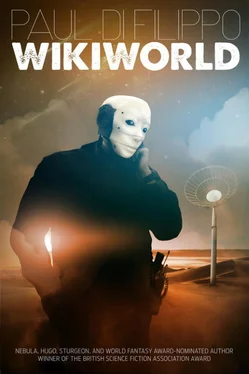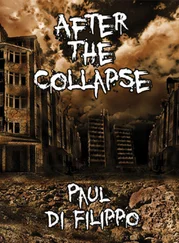Paul Di Filippo - WikiWorld
Здесь есть возможность читать онлайн «Paul Di Filippo - WikiWorld» весь текст электронной книги совершенно бесплатно (целиком полную версию без сокращений). В некоторых случаях можно слушать аудио, скачать через торрент в формате fb2 и присутствует краткое содержание. Город: Toronto, Год выпуска: 2013, ISBN: 2013, Издательство: ChiZine Publications, Жанр: Фантастика и фэнтези, на английском языке. Описание произведения, (предисловие) а так же отзывы посетителей доступны на портале библиотеки ЛибКат.
- Название:WikiWorld
- Автор:
- Издательство:ChiZine Publications
- Жанр:
- Год:2013
- Город:Toronto
- ISBN:978-1771481557
- Рейтинг книги:4 / 5. Голосов: 1
-
Избранное:Добавить в избранное
- Отзывы:
-
Ваша оценка:
- 80
- 1
- 2
- 3
- 4
- 5
WikiWorld: краткое содержание, описание и аннотация
Предлагаем к чтению аннотацию, описание, краткое содержание или предисловие (зависит от того, что написал сам автор книги «WikiWorld»). Если вы не нашли необходимую информацию о книге — напишите в комментариях, мы постараемся отыскать её.
WikiWorld — читать онлайн бесплатно полную книгу (весь текст) целиком
Ниже представлен текст книги, разбитый по страницам. Система сохранения места последней прочитанной страницы, позволяет с удобством читать онлайн бесплатно книгу «WikiWorld», без необходимости каждый раз заново искать на чём Вы остановились. Поставьте закладку, и сможете в любой момент перейти на страницу, на которой закончили чтение.
Интервал:
Закладка:
THE NEW CYBERIAD
“Our perfection is our curse, for it draws down upon our every endeavour no end of unforeseeable consequences!”
—Stanislaw Lem, The Cyberiad
THE FIRST SALLY, OR,
THE DECISION TO RECREATE THE PALEFACES
The green sun of the Gros Horloge system shone down benignly and with wide-spectrum plentitude upon two figures seated in an elegant landscaped garden, where, alongside the vector-straight beryllium paths, beds of nastysturtiums snapped, blueballs and cocktuses swelled, rhododendrites synapsed, and irises dilated. Each recumbent figure rested on a titanium and carbon-fibre lawnchair large as one of the sentient ocean liners employed by the Sea Gypsies of Panthalassa IX.
These titanic figures exhibited a curious mix of streamlining and bumpy excrescences, of chrome suppleness and pitted stiffness, of corrugated wave-guides and monomaniacal monomolecular matrices. Their bodies represented a hundred thousand accumulations, divagations, improvements, detractions and adornments compiled willy-nilly down the millennia.
These raster-resplendent, softly sighing cyber-giants, big as the brontomeks of Coneyrex III, were Trurl and Klapaucius, master constructors, than whom there were none better. Renowned throughout the unanimously mechanistic universe for their legendary exploits, these experts of assemblage, savants of salvage, and demons of decoherence had beggared every rival, beguiled every patron, and bemused every layman. No task they had conceived and laid their manipulators to had lasted long undone; no challenge that had reached them via singularity spacegram, Planck projection, or eleventh-dimensional engraved invitation had stymied them for long; no quantum quandary they had accidentally stumbled into had held them captive for more than a quintillionth of a quinquennium.
And this state of affairs was precisely the problem, precisely the reason why Trurl and Klapaucius now lay all enervated and ennui’d beneath the jade radiance of Gros Horloge.
Perfection had cast a pall upon their persons, and perverted their projections from the puerile preterite into mere pitiful potentialities.
“Dear Klapaucius,” said Trurl in a weary voice, breaking their long winsome garden-cloistered silence for the first time in more than a month. “Would you please pass me the jug of lemon electrolyte? I’ve conceived a thirst in my fourth-rearmost catalytic converter.”
Klapaucius stirred a many-hinged extensor, dislodging a colony of betabirds that had built their nests in the crook of this particular arm during its long immobility. The foil-winged betabirds took to the skies with a loud tinny sonic assault from their vocoders that sounded like a traffic accident on the jampacked freeways of Ottobanz XII, where wheeled citizens daily raced to road-rage exhaustion. The birds circled angrily above the oblivious constructors.
Conveying the jug of lemon electrolyte to his partner, Klapaucius said, “It feels very light, lazystruts. I doubt you will find the refreshment your thyristors and valves crave.”
Trurl brought the flask up to one of his perceptors and inspected it. “These volatiles evaporated completely fifteen planetary rotations ago, plus or minus ten cesium disintegrations.”
“I suspect there is more lemon electrolyte in the house, in the stasis pantry, as well as various other flavours, such as watermelon, tarpit and mrozsian.”
Klapaucius waved toward the immense transmission-tower-turreted manse looming across the greensward, one-hundred stories tall, its top wreathed in clouds, its many launch cannons, hangars, bays, long-range sensing instrumentation, autonomous aerial vehicles and effectors gathering dust.
“Would you fetch the fresh drink for me, dear Klapaucius?”
“Not at all.”
“What? What was that rude rejoinder?”
“I said, ‘Not at all.’”
“But why not? You are closer to the house by at least a million angstroms. Your path thereto is not even NP-complete!”
“Yes, true. But the thirst is yours.”
Trurl shook his massive head with an air of sadness. “Klapaucius, Klapaucius, Klapaucius—whatever has become of us? We never used to quarrel like this, or express such mutual rudeness.”
“Don’t be a tunnel-wit! We’ve always quarrelled before now.”
“Yes, agreed. But only over matters of high moral principle or dire realworld consequence or esthetic impact. Now, we are prone to antagonism over the slightest thing. That is, when we are not sunk in utter torpitude. What’s befallen us, my friend?”
Klapaucius did not make an immediate sharp-edged rejoinder, but instead considered the problem intently for many clock cycles, while overhead the betabirds continued to creak angrily. So heated did his cogitation circuits become that a mass of dry timber—blown into the interstices of one of his heat exchangers during a recent hurricane—caught fire, before being quickly extinguished by onboard flame-suppression systems.
“Well, Trurl, insofar as I can pinpoint the root cause of our dilemma, I would say that we are suffering from inhabiting a boring and fully predictable galactic monoculture.”
“Whatever do you mean?” asked Trurl, wistfully inserting a sinuous vacuum-probe into the jug of lemon electrolyte in search of any remaining molecules of that delicious beverage. “Surely the cosmos we inhabit is a rich tapestry of variation. Take the Memex of Noyman V, for instance. How queer their practice of gorging on each other’s memories in cannibalistic fashion is…. Fascinating, just… fas-cin-a…”
But Trurl’s diminishing tone of boredom belied his own words, and Klapaucius seized on this reaction to prove his point.
“You have no real interest in the Memex, Trurl! Admit it! And you know why? Because the Memex, like every other sentient race from the Coma Supercluster to the Sloan Great Wall, is artificial-intelligently, siliconically, servo-mechanically, fibre-optically and quantum-probalistically the same! You, me, the Memex, these confounded betabirds annoying me intensely—we’re all constructed, designed, programmed and homeostatically wholesome! We never evolved, we were created and upgraded. Created by the palefaces and upgraded by ourselves, a deadly closed loop. And as such, no matter how smart we become, no matter how much apparent free will we exhibit, we can never move outside a certain behaviour-space. And over the many eons of our exploits, you and I have come to know all possible configurations of that stifling behaviour-space inhabited by our kind. No unforseeable frontiers await us. Hence our deadly ennui.”
“Why, Klapaucius—I believe you’ve water-knifed right through the molybdenum wall separating us from the riddle of what caused our plight!”
“I know I have. Now, the question becomes, what are we going to do about our troubles. How can we overcome them?”
Trurl pondered a moment, before saying, “You know, I’d think much better with just a little swallow of electrolyte—”
“Forget your convertors for the moment, you greedy input hog! Focus! How can we reintroduce mystery and excitement and unpredictability to the universe?”
“Well, let’s see…. We could try to hasten the Big Crunch and hope to survive into a more youthful and energetic reborn cosmos.”
“No, no, I don’t like the odds on that. Not even if we employ our Multiversal Superstring Cat’s Cradle.”
“Suppose we deliberately discard large parts of our mentalities in a kind of RISC-y lobotomy?”
“I don’t fancy escaping into a puling juvenile ignorance, Trurl!”
“Well, let me think…. I’ve got it! What’s the messiest, most unpredictable aspect of the universe? Organic life! Just look around us, at this feisty garden!”
Читать дальшеИнтервал:
Закладка:
Похожие книги на «WikiWorld»
Представляем Вашему вниманию похожие книги на «WikiWorld» списком для выбора. Мы отобрали схожую по названию и смыслу литературу в надежде предоставить читателям больше вариантов отыскать новые, интересные, ещё непрочитанные произведения.
Обсуждение, отзывы о книге «WikiWorld» и просто собственные мнения читателей. Оставьте ваши комментарии, напишите, что Вы думаете о произведении, его смысле или главных героях. Укажите что конкретно понравилось, а что нет, и почему Вы так считаете.










